
The Biggest Literary Stories
of the Year: 50 to 31
Not All of Them Are Bad, Promise
At this point, what is really left to say about 2020? It was pretty bad, overall. Some parts were okay. There were some good books. There were some bad actions. There were some much-needed reckonings. Our lives and listicle intros were overwhelmed by a deadly pandemic (bad), a treasonous president (worse), and righteous protests (better, but bittersweet). Still, time stops for no man nor website, and soon it will be 2021. Is the transition from one year to the other symbolic at best? Of course. But this is how we register the shape of our lives, not to mention our content, so there’s no use stopping now.
Starting today, we’ll be counting down the 50 biggest literary stories of the year, so you can remember the good (yes, there was some!), the bad, and the Zoom book launch. Join us, won’t you, on this very special journey.

50. Margaret Atwood rode a scooter.
As we reported at the time, in the dark chill of February, beloved and distinguished literary titan and octogenarian Margaret Atwood, whilst in New Zealand to promote the release of The Testaments, cheered us all to no end by hopping on a cherry-red electric scooter. “I shouldn’t have,” she tweeted, “but I did.” –Emily Temple, Managing Editor
I shouldn’t have, but I did. That’s Alex @FaneProductions killing himself laughing. I didn’t run over anyone (this time). #wellington N Z: filled with temptations! pic.twitter.com/WJynbkG28X
— Margaret E. Atwood (@MargaretAtwood) February 9, 2020
Article continues after advertisement

49. $3.2 million worth of rare stolen books were found under a house in rural Romania.
Some crimes, like embezzling funds from an orphanage, are bad. Other crimes, like toppling a Confederate statue and rolling it into the ocean, are good. But then there are crimes which can only be described as cool. Heists, especially heists where nobody gets hurt, often fall into this category. It’s why we make so many films about them.
One such cool heist occurred in London in January of 2017, when rare books worth a whopping £2.5m were stolen from a postal transit warehouse in what the Guardian described as a “daring Mission Impossible-style heist.” God, what I wouldn’t give to be involved in a daring Mission Impossible-style heist…
As our own Corinne Segal wrote of the case: “Who would target such rare titles—including a 1566 edition of On the Revolutions of the Heavenly Spheres by Nicolaus Copernicus, worth $268,000—that they would be essentially impossible to sell on the black market?”
The answer, it appears, was “a notorious Romanian crime syndicate.” Yes, in September, after a two-and-a-half-year operation—coordinated between British, Romanian and Italian police—the cache of rare tomes, which included first editions of significant works by Galileo and Sir Isaac Newton, were recovered from under the floor of a house in rural Romania.
Police arrested a baker’s dozen of literary Thomas Crowns in connection to the (again, very cool) heist as well as a string of other high-profile burglaries. –Dan Sheehan, Book Marks Editor

48. The Dean Koontz Covid Conspiracy.
A debate raged briefly in late February of this year over whether or not Dean Koontz predicted the coronavirus in his 1981 pandemic thriller The Eyes of Darkness. The short answer is: no. Definitely no. Absolutely not. In the book, the Chinese government has developed a deadly disease in Wuhan-based laboratories—already a significant divergence from 2020 facts given that Covid evolved in Mother Nature’s laboratories—and Koontz’s fictional disease presents with entirely different symptoms from our current predicament. Dean Koontz may have many talents, but we’ll go ahead and cross “clairvoyant” off the list. –Molly Odintz, CrimeReads Senior Editor

47. The American Library Association rescinded the Literary Landmark status of Confederate president Jefferson Davis’ home.
That’s right: The Executive Committee of United for Libraries (a division of the American Library Association) announced that Beauvoir, the house of Confederate president Jefferson Davis, would no longer be an official Literary Landmark. This decision came after weeks of protest in June, following the murder of George Floyd. According to its press release, the committee said:
“We reject the racist and wrong ‘Lost Cause’ ideology promoted in Jefferson Davis’ memoirs and by the site’s owners. The site’s focus does not match United for Libraries’ values. The continued inclusion of Beauvoir as a Literary Landmark was an oversight—one that we are rectifying.” –Rasheeda Saka, Editorial Fellow
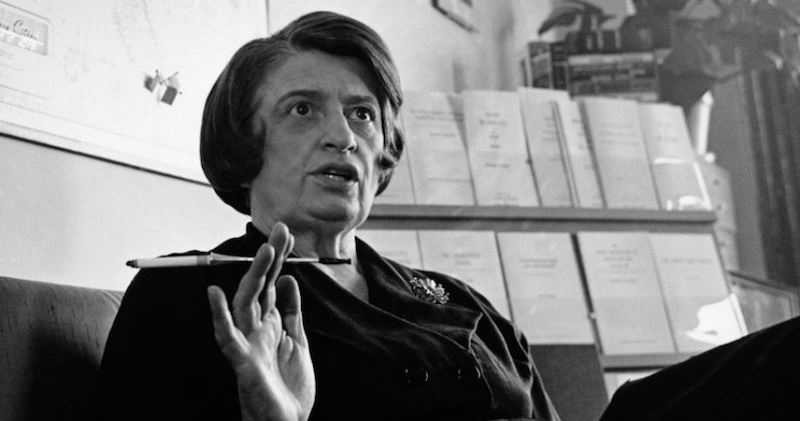
46. The Ayn Rand Institute bootstrapped its way to a PPP Loan of at least $350K.
In July, the Ayn Rand Institute, a nonprofit “devoted to applying Rand’s ideas to current issues and seeking to promote her philosophical principles of reason, rational self-interest and laissez-faire capitalism,” accepted . . . government assistance: a Paycheck Protection Program (PPP) loan between $350K and $1 million. Not exactly pulling itself up by its bootstraps, is it? –ET

45. The largest ever book advance for a debut children’s writer was given to the author of a book about flesh-eating unicorns.
Annabel Steadman, a 28-year-old lawyer from England, landed a seven-figure book deal—the world’s largest ever book advance for a debut children’s writer—for a fantasy series about “bloodthirsty unicorns.” According to The Guardian, Skandar and the Unicorn Thief is “set in a world where unicorns are deadly, and can only be tamed by the rider who hatches them, the series follows Skandar Smith, who is preparing to become a unicorn rider.” Sony Pictures also signed a seven-figure deal for the film rights. Good for Steadman; at least someone’s 2020 wasn’t a total fucking nightmare. –Emily Firetog, Deputy Editor

44. Literary gossip accounts on Twitter got us weak(ly).
You thought it, @publishersweakly said it. This spring, an anonymous Twitter account (a play on Publishers Weekly) called out the book industry for its systemic racism, financial inaccessibility, and mistreatment of workers.
Why now? Maybe it’s because the satirist had more time on their hands during the quarantine in April, but it also feels like a long overdue reckoning. It’s a continuation of the conversation started by the American Dirt controversy (more on this in another installment of “The Biggest Literary Stories of the Year”). They came for the #BooksAreEssential hashtag, which offensively insinuated that bookstores were as necessary as, say, health clinics and pharmacies. The Big Five were also dragged.
Devastatingly, the account has been deleted, but don’t worry: I wrote a few of these gems down for your viewing pleasure.
“Booksellers come and go (ie. starve or go bankrupt from a sinus infection sans health insurance or ultimately change careers) but bookstores are forever [heart emojis]” (Yikes!)
“I guess this pandemic is proof that publishing can be done anywhere, right?” (Not no!)
“The cool thing about publishing is doing unpaid labor for college credit in service of getting a job that they’ll underpay you for for a couple of years and then maybe they’ll let you rise through the ranks and pay you what you deserved from the start.” (Insert side-eye emoji here.) –Katie Yee, Book Marks Associate Editor

43. A Donna Tartt novel became the sacred text of a Tik Tok subculture.
Ah yes, we cannot forget the app that has caused such a playful ruckus that even Donald Trump issued an executive order in an attempt to ban it from all U.S. app stores. Beyond nefarious political agendas, though, a somewhat delicious and utterly hilarious trend emerged on Tik Tok in late June: Dark Academia, which is perhaps every academic’s worst nightmare.
With the state of formal education thrown into flux, it was actually no surprise to find a trend that romanticized the “aesthetics” of bookishness and glorified attending an old, New England-esque university, where one can attend classes in-person, go to college parties, and, you know, do all the things one sees in films like The Dead Poet’s Society, Kill Your Darlings or even The Social Network.
Enter, the holy text that this subculture relies upon: Donna Tartt’s The Secret History, a novel that follows a young man’s calamitous time at a Vermont university, where he befriends a group of well-off students who wear tweed jackets, French cuffed dress shirts, Charvet neckties, and who can go on and on about Latin and Greek epic poetry. (Also they murder people, but whatever.)
A typical Dark Academia Tik Tok post might feature a teenager or young adult wearing an oversized patterned blazer with a black turtleneck shirt tucked into high-waisted light-brown corduroy bermuda shorts, holding a stack of books that all curiously have similar brown book covers.
Is the trend hyper-stylized and an enormous performance? Well, yes, of course. But the trend is largely innocuous and fun, and that is, in fact, a lot to ask for and have in this tumultuous year of 2020. –RS
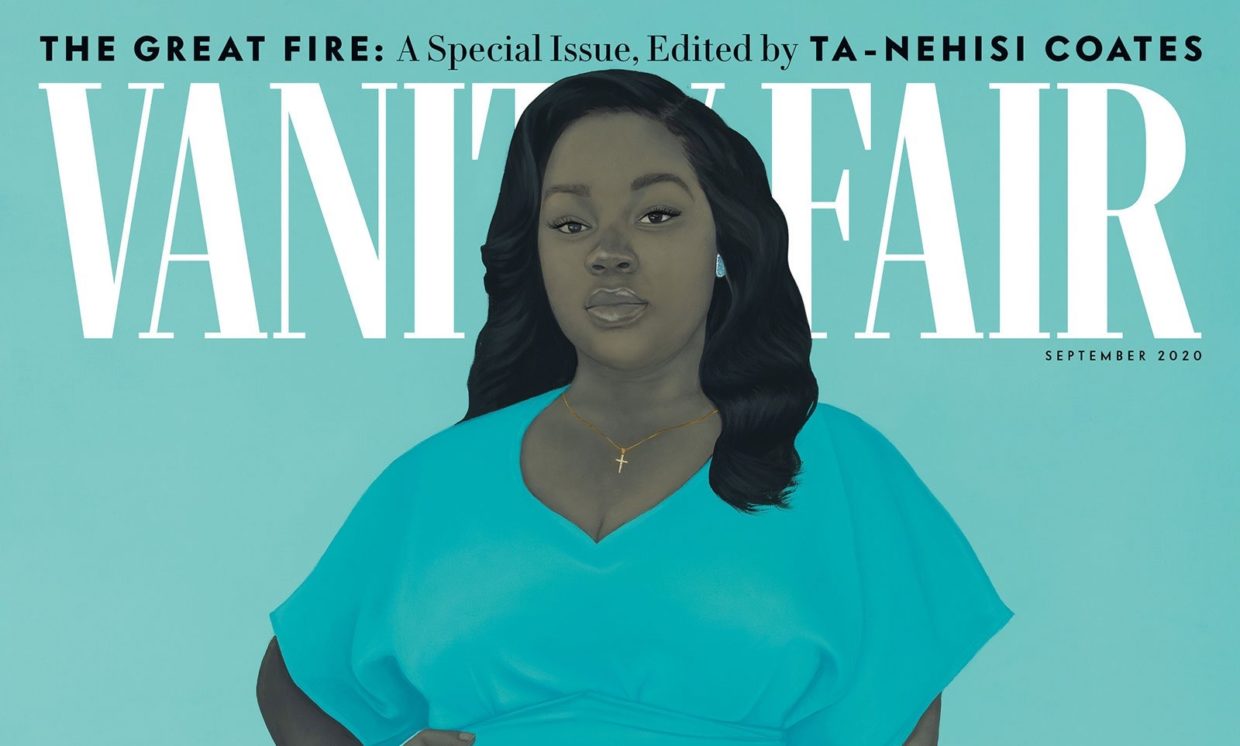
42. Vanity Fair hired a bunch of literary writers, and we all rejoiced.
If you, like me, feel like a fish out of water when it comes to all things fashionable—if you consider yourself more Andy Sachs than Emily Charlton or Miranda Priestly—perhaps you will be pleasantly surprised to see a few familiar names on the Vanity Fair masthead. This August, editor Radhika Jones announced a slew of new hires, including Jesmyn Ward, Ta-Nehisi Coates, and Kiese Laymon as contributing editors.
Personally, Vanity Fair has not historically been one of the publications I turn to because I don’t need someone I don’t know telling me to buy expensive perfume I can’t afford. On the other hand: Her Body and Other Parties author Carmen Maria Machado reviewing this season’s fragrances? Now I’m interested. –KY

41. Hobby Lobby had an Epic of Gilgamesh scandal, as you do.
What does one of the earliest works of world literature have to do with an American chain of arts-and-crafts stores? The answer is weird and surprisingly convoluted.
David Green, the owner of Hobby Lobby, has received frequent criticisms regarding his opposition to homosexuality, the Affordable Care Act, and his initial response to the coronavirus, which was to declare Hobby Lobby as an essential service. Since 2009, the company has also been the subject of an ongoing smuggling scandal involving artifacts meant to be included in the Green family-funded Museum of the Bible.
Despite warnings that the clay bulla and tablets were likely stolen or of dubious origin, Hobby Lobby representatives didn’t do much about it until 2018, when a federal district court ordered the company to return thousands of artifacts and pay a $3 million fine. In April of this year, one month after the Museum of the Bible was forced to repatriate an additional 11,500 items to the Middle East, the museum’s centerpiece, its Dead Sea Scrolls fragments, were revealed to be fakes.
In May, federal prosecutors filed a suit to confiscate the Gilgamesh Dream Tablet, which has part of the Epic of Gilgamesh inscribed (in it, the protagonist King Gilgamesh of Uruk describes his dreams to his mother). The tablet is currently being held by the Department of Homeland Security. Pending a forfeiture order, the plan is for the Gilgamesh Dream Tablet to return to its original home in Iraq. However, in August the Daily Beast analyzed a proposed agreement between Hobby Lobby/the Museum of the Bible (HL/MOTB) and the Iraqi government.
Oddly, the memo outlined a renewable five-year loan plan for the Dream Tablet at a time when neither HL/MOTB nor Iraq owned it. It has been suggested that if Iraq agrees to loan the tablet to the Museum of the Bible, the artifact may be stuck in limbo longer than previously thought. –Aaron Robertson, Assistant Editor
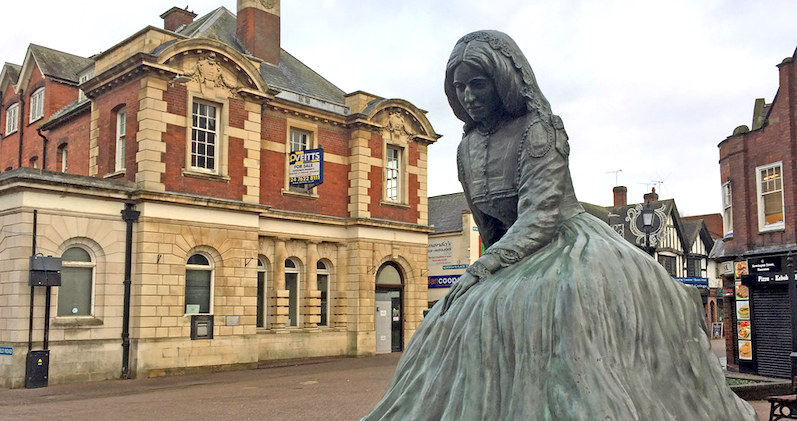
40. Far-right “statue defenders” didn’t know who George Eliot was.
Amidst worldwide protests in support of Black Lives Matter, supporters took down a statue of a 17th-century slave trader in Bristol. In response, statue “defenders” began standing in front of various statues of warmongers and colonialists, but one group of plucky literary history lovers in the town of Nuneaton began guarding a statue of the writer George Eliot. As you may know, George Eliot, the pen name of Mary Ann Evans, was one of the Victorian era’s great writers and a supporter of the anti-slavery movement. She had a long, epistolary friendship with Harriet Beecher Stowe and questioned the morality of slavery in her 1862 novel Romola.
On the plus side, it’s nice to see that even in lockdown that Nuneaton’s Paramilitary Literary Society managed a get together to discuss The Mill on the Floss. https://t.co/kDcwguJyDN
— Jonathan Mock., Esq⚙️ (@MrJonathanMock) June 16, 2020
Twitter had a field day! And when the Daily Mail makes fun of your stupidity, you really have hit a new low. –EF

39. Steph Cha became the new editor of the Best American Mystery series.
After 23 years with Otto Penzler as editor, Houghton Mifflin Harcourt announced on September 3 that they had decided to go in a new direction for the Best American Mystery Stories, with Steph Cha as the new editor of the series (which probably felt pretty vindicating, considering Cha’s history with Penzler). HMH will also be rebranding the series as the Best American Mystery & Suspense Stories, with a new mission to include more stories from traditionally marginalized voices and appeal to the changing needs of mystery readers.
Cha, of course, announced her new role with aplomb, using it as a way to highlight the truth about diversity in publishing: that “Every reader from your mom to the head of a publishing house looks for quality according to their own taste, and taste folds in all kinds of personal bias. This is why publishing will never fix its diversity problem by buying diverse books without hiring diverse editors.” –MO

38. The oldest English-language bookstore in Hong Kong closed.
In the middle of the summer, during an extended lockdown and government repression, Hong Kong’s oldest English-language bookstore announced it would close after decades of service. Swindon Book Company Ltd was founded in 1918 and had a beautiful marble shopfront with gold lettering above its doors. “Swindon has been a part of Hong Kong’s history for over a century, in our everyday lives as generations have grown up, and even as a backdrop in movies,” the company said. The South China Morning Post reports that Swindon, which had survived multiple deadly virus outbreaks and world wars, will be moving their operations online. –EF

37. Former Baltimore Mayor Catherine Pugh was sentenced to three years in prison for lying about her self-published children’s book business.
In June 2020, former Baltimore Mayor Catherine Pugh pleaded guilty to a state perjury charge for failing to disclose a compromising business interest related to her “Healthy Holly” children’s books, a series about exercise and nutrition. She was sentenced to three years in federal prison after accumulating over $800,000 in bulk sales.
Pugh admitted to defrauding her purchasers to pay for donations toward her political campaigns and to fund the purchase and renovation of a home in Baltimore City.
According to Fox 5 DC, she earned at least $345,000 in income in 2016 through her book sales but failed to mention her ownership in financial disclosure forms, which are filed through the Maryland State Ethics Commission and signed under perjury penalties.
She also sold her books to the University of Maryland Medical System (UMMS), where she sat on a committee that funded said medical system. UMMS paid Pugh a total of $500,000 for 100,000 copies that were meant to be conferred to schoolchildren, but she never delivered 40,000 books, which were ultimately given to other customers for sale.
She is currently serving her sentence at a federal prison in Alabama, after which she’ll be on parole for another three years. –RS
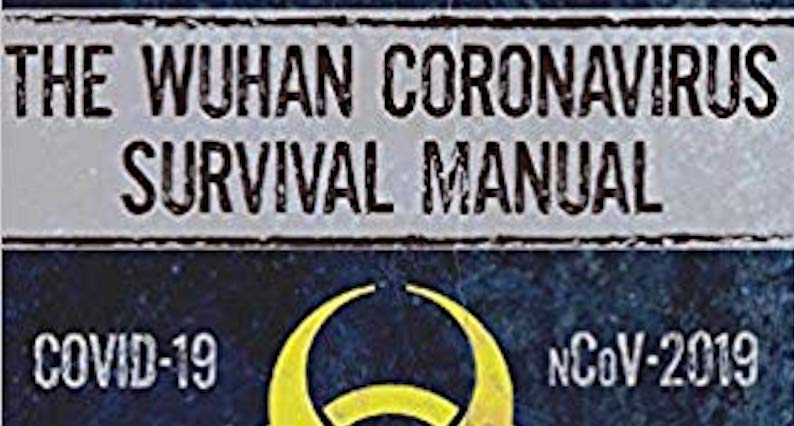
36. Amazon was taken to task for allowing the sale of far-right and COVID-19 conspiracy books in its marketplace.
Remember when Jeff Bezos became the first person in history to achieve a net worth of $200 billion? That was in the summer. Bezos got the bump as Amazon enjoyed record-level sales due to the pandemic.
It’s no surprise that many people do not like Bezos, least of all people like the bookseller who called him out during a July antitrust hearing in Congress. In addition to receiving criticism for its monopolistic approach to competition, Amazon had been accused of enabling and profiting from the circulation of white supremacist literature and coronavirus conspiracy theory books through its self-publishing arm.
Although the company has occasionally removed some of these books, plenty of the offending material remains available on the site. A Business Insider story from October showed that at least 1,000 items related to QAnon alone are on offer from third-party sellers, including more than a dozen books, some of which the site promotes.
Amazon spokespersons have continuously declined to comment when journalists ask whether the company will ban such merchandise. – AR
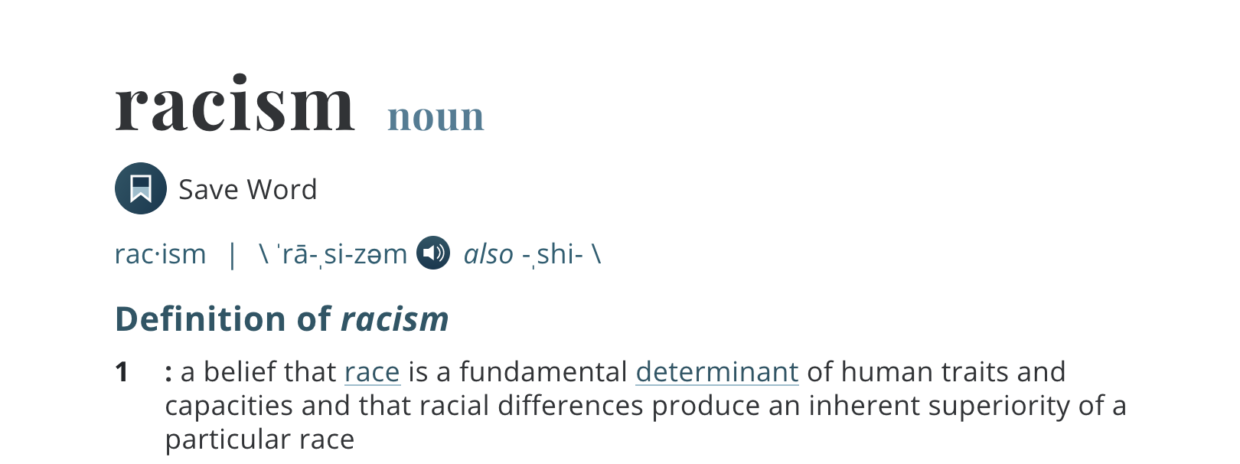
35. Merriam-Webster updated its definition of “racism.”
And naturally, one can’t help but wonder: well, what was its previous definition? And lo and behold it was: (1) a belief that race if the primary determinant of human traits and capacities and that racial differences produce an inherent superiority of a particular race; (2) a) a doctrine or political program based on the assumption of racism designed to execute its principles, b) a political or social system founded on racism; (3) racial prejudice or discrimination.
According to news reports, Merriam-Webster decided to make the update after they received an email from Kennedy Mitchum, a 22-year-old recent graduate of Iowa’s Drake University, who urged them to include a note on systemic racism and oppression. This came after four years of Mitchum advocating for a more nuanced and expanded understanding of racism and receiving Merriam-Webster’s definition as a dismissive response.
“I was just speaking on my social media about racism and just about how the things I was experiencing in my own school and my own college,” said Mitchum to BBC. “There were a lot of things that were racist but it wasn’t as blatant.”
She received a response from an editor the following day. –RS

34. Libraries and bookstores adapted to the new, COVID-19 infected world.
While publishers seem to be weathering COVID storm, pandemic lockdown has been far more damaging for libraries and independent bookstores.
For many indies, already operating on slim margins and starved of oxygen thanks to Amazon’s robber baron dominance of the industry, the pandemic—which has forced extended closures and slowed foot traffic down to a trickle—may ultimately prove catastrophic. Public libraries—some of the last free spaces in the U.S. where poor and vulnerable populations can find internet access, shelter, de facto childcare, and a sense of community—are also feeling the pain of extended closure.
That’s the bad news. The good news is that many bookstores and libraries have been coming up with new and innovative ways to maintain operations and let their patrons know that they’re still very much alive.
Curbside pickups, bicycle deliveries, virtual book launches and reading series, and Bookshop affiliate pages have all played a role in keeping the indie flame burning, while a majority of public libraries across the country have been expanding access to essential services for patrons in need, boosting their Wi-Fi signals, and increasing their bookmobile deliveries. –DS

33. The French literary establishment had its #MeToo moment.
One of the year’s first literary controversies began with the publication of French publisher Vanessa Springora’s book Consent (Le consentement). In the critically acclaimed book, Springora described the sexual relationship she had in the 1980s with author Gabriel Matzneff. Springora was 14 years old at the time and Matzneff, a respected nonfiction writer in France, was 50.
Springora wrote about coming under Matzneff’s influence as a troubled teenager and her struggle to understand the nature of consent and victimhood. The book was immediately cast as a major “#MeToo moment” for France’s elite literary world.
In an interview with L’Obs, Springora said, “I hope I can bring a small stone to the edifice currently being constructed around issues of domination and consent, always linked to the notion of power.”
Prosecutors in Paris opened a rape investigation one day after Consent was published, forcing the country to confront its questionable ennobling of men like Matzneff, who had been a known advocate of legalizing sex with children since the mid-1970s. French journalist Francesca Gee was the second woman to come out publicly against Matzneff, in April.
Matzneff went into exile in Italy and his French publisher pulled his books from the shelves. He is scheduled to go on trial in September 2021. The case, which has already been compared to the trial of Harvey Weinstein, is expected to not only scrutinize Matzneff’s actions but also those of his publishers and promoters. –AR
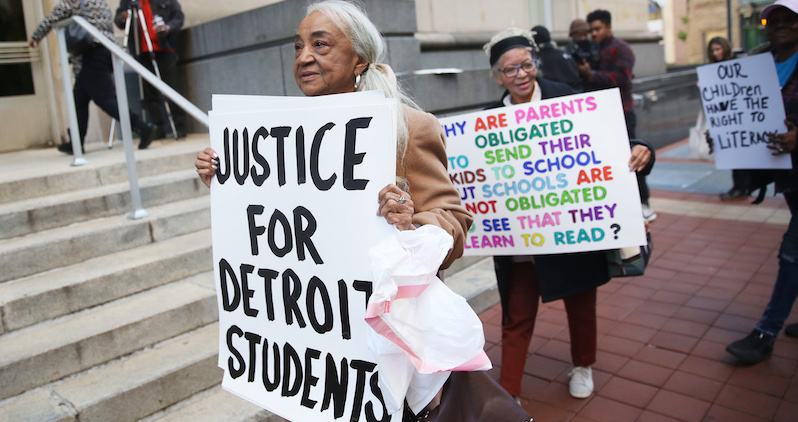
32. Briefly, literacy in some parts of the US was determined to be a constitutional right.
A bright light shone fleetingly for literacy advocates after a federal appeals court ruling in April appeared to enshrine the constitutional right “to a basic minimum education.”
The US 6th Circuit Court of Appeals handed down a decision in a 2-1 ruling after lawyers in Michigan argued that the state was denying education to Detroit Public School students, in violation of the 14th Amendment.
When the civil lawsuit was introduced in the fall of 2019 (Gary B v. Whitmer), stories ran about the subpar conditions that had long-plagued Detroit’s public school system. Legal experts said what made this case unique was the argument that a state itself—in this case, Michigan—was violating the Equal Protection Clause by excluding students from a free public education system.
The court specified that “basic minimum education” doesn’t imply “the quality that most have come to expect in today’s America.” Rather, “the right only guarantees the education needed to provide access to skills that are essential for the basic exercise of other fundamental rights and liberties, most importantly participation in our political system.”
Unfortunately, a couple of months after the ruling, the case was dismissed after a settlement was reached between the appellants and Michigan Governor Gretchen Whitmer, thus reversing the precedent-making decision. –AR

31. AWP was probably the only event that wasn’t canceled this year.
You know the old saying: the show AWP conference must go on! Despite the Covid-19 outbreak in March (especially in San Antonio, where the event was to be held), the Association of Writers & Writing Programs decided not to cancel.
AWP cited the importance of the event to the literary community as their justification for moving forward with the plans. (It is, after all, usually the biggest writers’ conference in North America.) They did send out a few guidelines in an attempt to address the coronavirus concerns (“This will be a handshake-free, hug-free conference.”). However, many felt that this was an irresponsible choice. Several organizations backed out of the conference, including Poets & Writers, VIDA, the Feminist Press, the Asian American Writers Workshop, Tin House, and Small Beer Press. Many writers, like T Kira Madden and Mira Jacob, cancelled their appearances. Also, AWP Executive Co-Director Diane Zinna resigned over the decision to hold the conference.
Fortunately, there was also the #AWPVirtualBookFair, a hashtag that presses and magazines used to let readers know about the discounts they would’ve received at the event. Honestly, this might have been the most equitable and accessible version of the conference yet. –KY
*
See you on Thursday for the next installment of our countdown of the biggest literary stories of the year!
Emily Temple
Emily Temple is the managing editor at Lit Hub. Her first novel, The Lightness, was published by William Morrow/HarperCollins in June 2020. You can buy it here.












